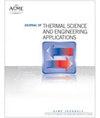3D CFD modeling using the RANS approach of Indirect-Type Solar Dryers based on Smooth and Corrugated Absorber Plates
IF 1.4
4区 工程技术
Q3 ENGINEERING, MECHANICAL
引用次数: 0
Abstract
Solar dryers are traditional devices used for drying various products. Different indirect solar dryer (ISD) geometries were theoretically examined using computational fluid dynamics (CFD). The paper presents a numerical investigation of two indirect solar dryers using CFD simulation, comparing the velocity and thermal performance of dryers with smooth and corrugated absorber plates. The temperature values obtained by numerical simulations were compared to the experimental measurements and it was found a maximum variation difference of 1.26%. The maximum velocity in the SAC and the value of average temperature at the SAC outlet were found to be 0.58 m/s and 336 K for the smooth absorber ISD, and 0.77 m/s and 350 K for the corrugated absorber ISD. It was observed that the corrugated absorber plate exhibited superior thermal performance and a higher maximum velocity compared to the smooth absorber plate. Within the cabinet, a uniform temperature profile was observed, particularly for the corrugated case. V-shaped absorber plate offer higher heat transfer rates, increased turbulence, and greater surface area for heat transfer, making them more efficient for drying processes compared to smooth absorber plate. Therefore, corrugated absorber plates in solar air collectors is a more efficient option than using smooth absorber plates.基于光滑板和波纹板的间接式太阳能干燥机的RANS方法的三维CFD建模
太阳能干燥机是用于干燥各种产品的传统设备。利用计算流体力学(CFD)对不同的间接太阳能干燥器(ISD)几何形状进行了理论分析。本文采用CFD模拟方法对两种太阳能间接干燥器进行了数值研究,比较了光滑板和波纹板吸收体干燥器的速度和热性能。将数值模拟得到的温度值与实验测量值进行比较,发现最大变化差为1.26%。结果表明,光滑型吸收体的SAC最大速度为0.58 m/s,出口平均温度为336 K;波纹型吸收体的SAC最大速度为0.77 m/s,出口平均温度为350 K。结果表明,与光滑吸收板相比,波纹吸收板具有更好的热性能和更高的最大速度。在机柜内,观察到均匀的温度分布,特别是对于瓦楞箱。v型吸收板提供更高的传热率,增加湍流,更大的传热表面积,使其更有效的干燥过程相比,光滑的吸收板。因此,在太阳能空气集热器中使用波纹吸收板比使用光滑吸收板更有效。
本文章由计算机程序翻译,如有差异,请以英文原文为准。
求助全文
约1分钟内获得全文
求助全文
来源期刊

Journal of Thermal Science and Engineering Applications
THERMODYNAMICSENGINEERING, MECHANICAL -ENGINEERING, MECHANICAL
CiteScore
3.60
自引率
9.50%
发文量
120
期刊介绍:
Applications in: Aerospace systems; Gas turbines; Biotechnology; Defense systems; Electronic and photonic equipment; Energy systems; Manufacturing; Refrigeration and air conditioning; Homeland security systems; Micro- and nanoscale devices; Petrochemical processing; Medical systems; Energy efficiency; Sustainability; Solar systems; Combustion systems
 求助内容:
求助内容: 应助结果提醒方式:
应助结果提醒方式:


